-
 Bitcoin
Bitcoin $83,443.6737
-1.76% -
 Ethereum
Ethereum $1,825.6264
-3.20% -
 Tether USDt
Tether USDt $0.9997
-0.02% -
 XRP
XRP $2.0597
-2.32% -
 BNB
BNB $597.9023
-1.48% -
 Solana
Solana $119.3459
-5.03% -
 USDC
USDC $0.9999
-0.01% -
 Dogecoin
Dogecoin $0.1660
-3.39% -
 Cardano
Cardano $0.6523
-3.11% -
 TRON
TRON $0.2359
-1.14% -
 Toncoin
Toncoin $3.8299
-5.08% -
 UNUS SED LEO
UNUS SED LEO $9.3665
0.55% -
 Chainlink
Chainlink $13.1586
-4.88% -
 Stellar
Stellar $0.2618
-2.77% -
 Sui
Sui $2.3705
0.07% -
 Avalanche
Avalanche $18.4778
-4.84% -
 Shiba Inu
Shiba Inu $0.0...01228
-1.59% -
 Hedera
Hedera $0.1637
-2.32% -
 Polkadot
Polkadot $4.0481
-1.61% -
 Litecoin
Litecoin $83.0708
-0.33% -
 MANTRA
MANTRA $6.3449
1.40% -
 Bitcoin Cash
Bitcoin Cash $299.2669
-2.15% -
 Bitget Token
Bitget Token $4.5420
-2.09% -
 Dai
Dai $0.9999
0.00% -
 Ethena USDe
Ethena USDe $0.9999
0.02% -
 Pi
Pi $0.6659
-4.49% -
 Hyperliquid
Hyperliquid $12.4532
-5.21% -
 Monero
Monero $215.7704
-0.13% -
 Uniswap
Uniswap $5.9598
-3.90% -
 Aptos
Aptos $5.2030
-1.76%
What is the historical performance timeline of Bitcoin ETFs?
The journey to Bitcoin ETFs has been marked by regulatory hurdles and market shifts, with futures ETFs approved but spot ETFs still pending due to SEC concerns.
Mar 28, 2025 at 04:36 pm

The Evolving Landscape of Bitcoin ETFs: A Historical Timeline
The journey towards Bitcoin Exchange-Traded Funds (ETFs) has been a long and winding one, marked by regulatory hurdles, market volatility, and shifting investor sentiment. Understanding this timeline is crucial for grasping the current state of Bitcoin ETF applications and their potential impact on the cryptocurrency market. While no Bitcoin spot ETF currently exists in the US, the progress made provides valuable insight.
The early years saw limited progress, primarily due to regulatory uncertainty surrounding cryptocurrencies. Regulators expressed concerns about market manipulation, price volatility, and investor protection. These concerns significantly hampered the development and approval of Bitcoin ETFs. The lack of a robust regulatory framework created a significant barrier to entry for ETF providers.
Early Attempts and Regulatory Challenges (Pre-2020)
Several attempts were made to launch Bitcoin ETFs in the early 2010s. These early proposals faced significant pushback from regulatory bodies like the Securities and Exchange Commission (SEC) in the United States. The SEC's primary concern was the lack of sufficient safeguards against market manipulation within the nascent Bitcoin market. This resulted in numerous rejections of ETF applications. Many proposed ETFs were deemed too risky for retail investors.
- Insufficient market surveillance: The SEC highlighted the lack of robust mechanisms to prevent market manipulation and insider trading in the Bitcoin market.
- Price volatility: The extreme price swings in Bitcoin were cited as a major concern for investor protection.
- Custodian concerns: The SEC questioned the security and reliability of Bitcoin custodians, raising concerns about the potential for theft or loss of assets.
The Rise of Bitcoin Futures ETFs (2021-Present)
A significant shift occurred in 2021 with the approval of Bitcoin futures ETFs. These ETFs track Bitcoin futures contracts rather than the underlying Bitcoin itself. This distinction was crucial for regulatory approval, as futures contracts are more regulated and offer a degree of price discovery. The approval of futures-based ETFs marked a major step forward, but it still left the demand for spot Bitcoin ETFs unmet.
The approval of futures-based ETFs, while not a direct investment in Bitcoin, provided investors with a regulated way to gain exposure to Bitcoin's price movements. This indirectly increased the legitimacy and accessibility of Bitcoin in the traditional financial markets. However, the indirect nature of exposure meant some investors still sought a spot ETF.
The Ongoing Pursuit of Spot Bitcoin ETFs (2022-Present)
The pursuit of a spot Bitcoin ETF continues to be a central focus in the cryptocurrency world. Numerous applications have been filed with the SEC, each facing intense scrutiny. The SEC continues to express concerns about market manipulation and investor protection, despite the maturation of the Bitcoin market. The ongoing debate highlights the complex interplay between innovation in the cryptocurrency space and the need for robust regulatory frameworks.
- Increased scrutiny of market surveillance mechanisms: Applicants are required to demonstrate robust surveillance-sharing agreements with exchanges to mitigate market manipulation risks.
- Focus on custody solutions: The SEC is scrutinizing the security and reliability of proposed custodians to ensure the safety of investor assets.
- Improved market maturity: The SEC is evaluating the maturity and liquidity of the Bitcoin market, considering factors such as trading volume and market depth.
The Impact of Regulatory Decisions on Market Sentiment
The SEC's decisions regarding Bitcoin ETF applications significantly impact market sentiment. Approvals tend to lead to increased investor confidence and potentially higher Bitcoin prices. Rejections, on the other hand, can lead to temporary price dips and a sense of uncertainty in the market. The ongoing regulatory process underscores the importance of clear and consistent regulatory frameworks for the growth and stability of the cryptocurrency market. The lack of clarity can create volatility.
The ongoing debate surrounding spot Bitcoin ETFs highlights the challenges of integrating cryptocurrencies into traditional financial markets. The SEC’s cautious approach reflects the need to balance innovation with investor protection. The outcome of pending applications will likely shape the future of Bitcoin ETFs and the broader cryptocurrency landscape.
Key Considerations for Investors: Investors should understand that even with a spot Bitcoin ETF, the inherent volatility of Bitcoin remains. It's crucial to conduct thorough research and assess your risk tolerance before investing.
Frequently Asked Questions
Q: What is a Bitcoin ETF?
A: A Bitcoin ETF is an exchange-traded fund that tracks the price of Bitcoin. It allows investors to gain exposure to Bitcoin through a regulated investment vehicle, similar to traditional stock ETFs.
Q: Why haven't spot Bitcoin ETFs been approved in the US?
A: The SEC has expressed concerns about market manipulation, price volatility, and investor protection in the Bitcoin market, hindering the approval of spot Bitcoin ETFs.
Q: What are the differences between Bitcoin futures ETFs and spot Bitcoin ETFs?
A: Futures ETFs track Bitcoin futures contracts, while spot ETFs track the actual price of Bitcoin. Futures ETFs have been approved due to the more regulated nature of futures contracts.
Q: What is the significance of the SEC's decisions on Bitcoin ETF applications?
A: The SEC's decisions significantly influence market sentiment and investor confidence. Approvals can boost Bitcoin's price and increase market participation, while rejections can lead to uncertainty and price corrections.
Q: What are the potential benefits of a spot Bitcoin ETF?
A: A spot Bitcoin ETF would offer investors a more direct and potentially more efficient way to invest in Bitcoin through a regulated exchange, increasing accessibility and liquidity.
Q: What are the risks associated with investing in Bitcoin ETFs?
A: Bitcoin's price volatility remains a significant risk. Investors should be aware of the potential for substantial price fluctuations and should only invest what they can afford to lose. Regulatory uncertainty also poses a risk.
Disclaimer:info@kdj.com
The information provided is not trading advice. kdj.com does not assume any responsibility for any investments made based on the information provided in this article. Cryptocurrencies are highly volatile and it is highly recommended that you invest with caution after thorough research!
If you believe that the content used on this website infringes your copyright, please contact us immediately (info@kdj.com) and we will delete it promptly.
- Grayscale Investments Launches Two New Bitcoin (BTC) Exchange-Traded Funds (ETFs)
- 2025-04-03 09:15:12
- US President Donald Trump announced reciprocal tariffs against every country with a trade relationship with the US
- 2025-04-03 09:15:12
- BlockDAG Launches Beta Testnet With $200M Raised, Ethereum Approaches $2,000 & Tether Expands Into Media
- 2025-04-03 09:10:12
- Trump Announces New Base Tariff of 10% on All Countries, Targeting EU and Japan with Higher Duties
- 2025-04-03 09:10:12
- Fidelity launches new retirement accounts that will allow Americans to invest in crypto nearly fee-free
- 2025-04-03 09:05:12
- AAVE Price Dipped Following Large-Scale Whale Sell-offs, But Technical Charts Hint at a Potential Bullish Reversal
- 2025-04-03 09:05:12
Related knowledge
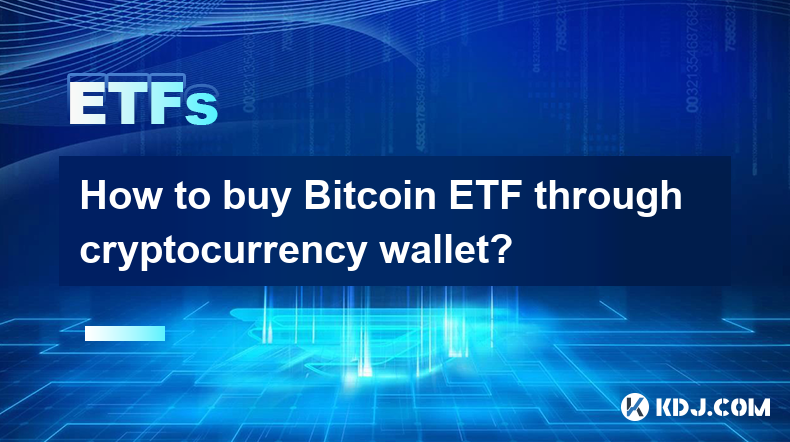
How to buy Bitcoin ETF through cryptocurrency wallet?
Mar 30,2025 at 08:22pm
It's important to understand that you cannot directly buy a Bitcoin ETF through a cryptocurrency wallet. Cryptocurrency wallets are designed to hold and manage digital assets like Bitcoin itself, not exchange-traded funds (ETFs). Bitcoin ETFs are traded on traditional stock exchanges, not decentralized cryptocurrency exchanges. Therefore, the process i...
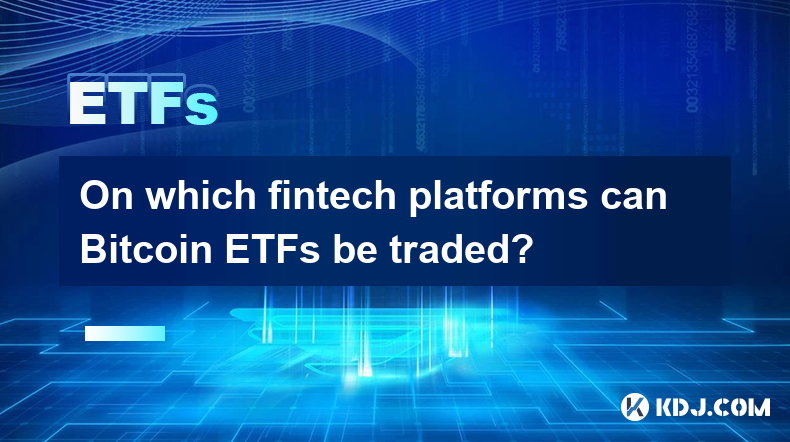
On which fintech platforms can Bitcoin ETFs be traded?
Mar 28,2025 at 09:21am
Navigating the Bitcoin ETF Landscape on Fintech PlatformsThe availability of Bitcoin ETFs on fintech platforms is a rapidly evolving landscape. Currently, the approval and subsequent listing of Bitcoin ETFs are subject to regulatory hurdles and vary significantly by jurisdiction. Therefore, the specific platforms offering Bitcoin ETF trading depend hea...
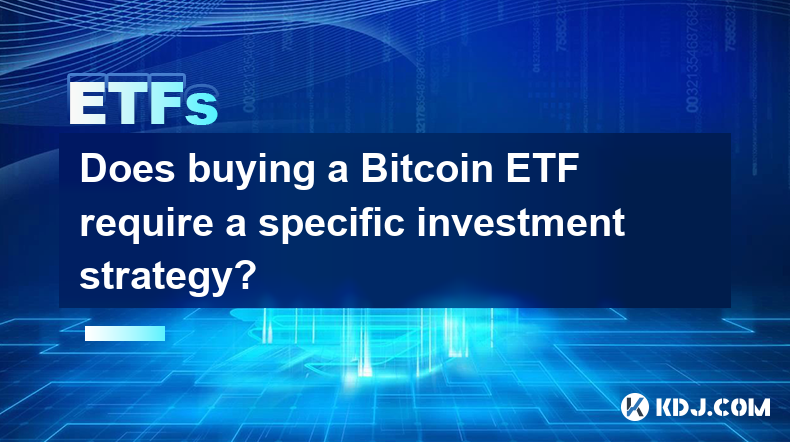
Does buying a Bitcoin ETF require a specific investment strategy?
Mar 27,2025 at 06:36pm
Understanding Bitcoin ETFs and Investment StrategiesA Bitcoin Exchange-Traded Fund (ETF) is a type of investment fund that tracks the price of Bitcoin. Investing in a Bitcoin ETF offers exposure to the cryptocurrency market without the complexities of directly owning and securing Bitcoin. However, like any investment, a successful strategy requires car...
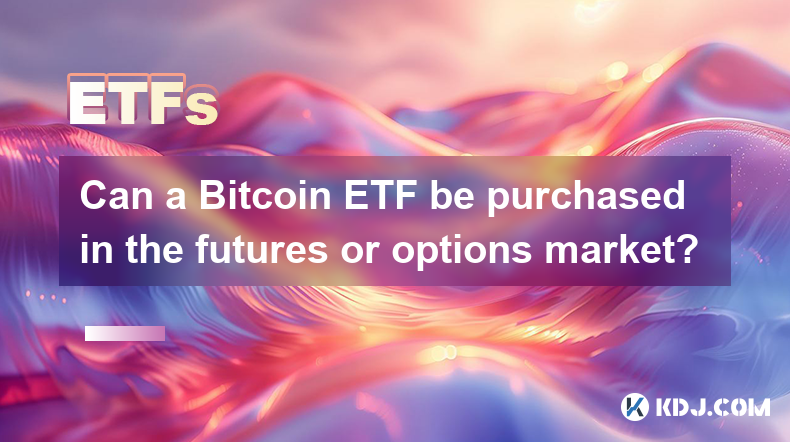
Can a Bitcoin ETF be purchased in the futures or options market?
Mar 27,2025 at 02:49am
Understanding Bitcoin ETFs and Derivative MarketsA Bitcoin ETF (Exchange-Traded Fund) is a fund that tracks the price of Bitcoin. Unlike directly buying Bitcoin, an ETF offers a more regulated and accessible way for investors to gain exposure to the cryptocurrency market through traditional brokerage accounts. However, the availability of a Bitcoin ETF...
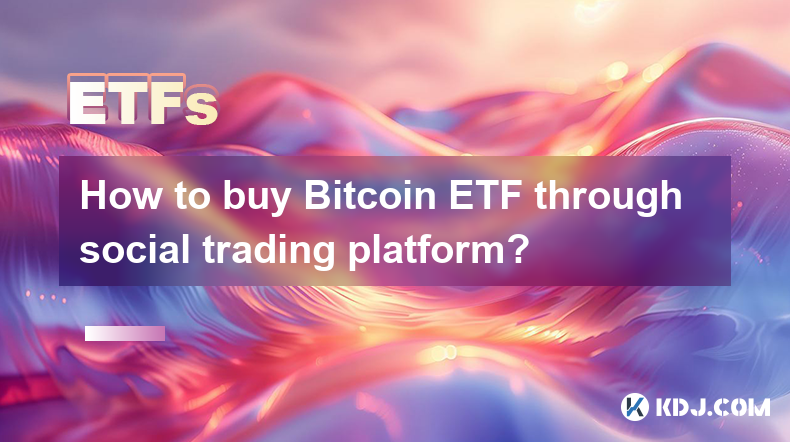
How to buy Bitcoin ETF through social trading platform?
Mar 27,2025 at 10:43am
How to Buy Bitcoin ETF Through Social Trading Platforms? Understanding Bitcoin ETFs and Social TradingA Bitcoin ETF (Exchange-Traded Fund) is a fund that tracks the price of Bitcoin. Unlike directly buying Bitcoin, an ETF offers a regulated and potentially less volatile way to gain exposure to the cryptocurrency market. This is because ETFs are traded o...
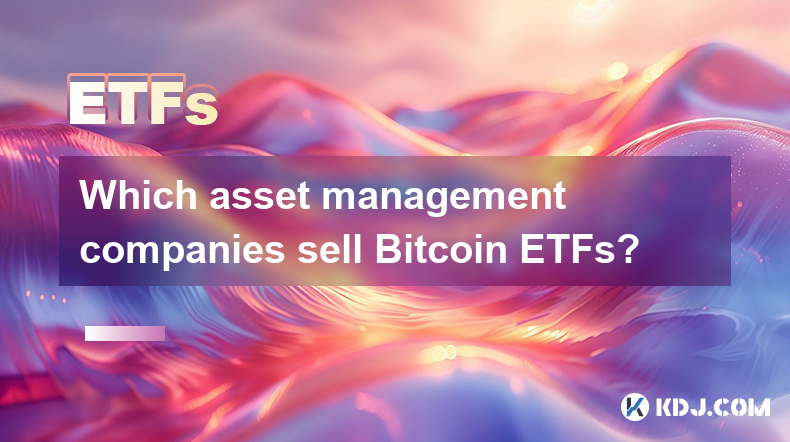
Which asset management companies sell Bitcoin ETFs?
Mar 28,2025 at 02:21am
The Current Landscape of Bitcoin ETF OfferingsCurrently, no asset management company offers a fully-fledged, SEC-approved Bitcoin ETF in the United States. While several companies have filed applications, the Securities and Exchange Commission (SEC) has yet to approve any. This is primarily due to concerns surrounding market manipulation, investor prot...

How to buy Bitcoin ETF through cryptocurrency wallet?
Mar 30,2025 at 08:22pm
It's important to understand that you cannot directly buy a Bitcoin ETF through a cryptocurrency wallet. Cryptocurrency wallets are designed to hold and manage digital assets like Bitcoin itself, not exchange-traded funds (ETFs). Bitcoin ETFs are traded on traditional stock exchanges, not decentralized cryptocurrency exchanges. Therefore, the process i...

On which fintech platforms can Bitcoin ETFs be traded?
Mar 28,2025 at 09:21am
Navigating the Bitcoin ETF Landscape on Fintech PlatformsThe availability of Bitcoin ETFs on fintech platforms is a rapidly evolving landscape. Currently, the approval and subsequent listing of Bitcoin ETFs are subject to regulatory hurdles and vary significantly by jurisdiction. Therefore, the specific platforms offering Bitcoin ETF trading depend hea...

Does buying a Bitcoin ETF require a specific investment strategy?
Mar 27,2025 at 06:36pm
Understanding Bitcoin ETFs and Investment StrategiesA Bitcoin Exchange-Traded Fund (ETF) is a type of investment fund that tracks the price of Bitcoin. Investing in a Bitcoin ETF offers exposure to the cryptocurrency market without the complexities of directly owning and securing Bitcoin. However, like any investment, a successful strategy requires car...

Can a Bitcoin ETF be purchased in the futures or options market?
Mar 27,2025 at 02:49am
Understanding Bitcoin ETFs and Derivative MarketsA Bitcoin ETF (Exchange-Traded Fund) is a fund that tracks the price of Bitcoin. Unlike directly buying Bitcoin, an ETF offers a more regulated and accessible way for investors to gain exposure to the cryptocurrency market through traditional brokerage accounts. However, the availability of a Bitcoin ETF...

How to buy Bitcoin ETF through social trading platform?
Mar 27,2025 at 10:43am
How to Buy Bitcoin ETF Through Social Trading Platforms? Understanding Bitcoin ETFs and Social TradingA Bitcoin ETF (Exchange-Traded Fund) is a fund that tracks the price of Bitcoin. Unlike directly buying Bitcoin, an ETF offers a regulated and potentially less volatile way to gain exposure to the cryptocurrency market. This is because ETFs are traded o...

Which asset management companies sell Bitcoin ETFs?
Mar 28,2025 at 02:21am
The Current Landscape of Bitcoin ETF OfferingsCurrently, no asset management company offers a fully-fledged, SEC-approved Bitcoin ETF in the United States. While several companies have filed applications, the Securities and Exchange Commission (SEC) has yet to approve any. This is primarily due to concerns surrounding market manipulation, investor prot...
See all articles
























































































